Entrepreneurship: Small Business, Economic Impact & Success
VerifiedAdded on 2020/10/22
|15
|4346
|455
Report
AI Summary
This report provides an overview of entrepreneurship and small business management, examining different types of entrepreneurial ventures and entrepreneurship, highlighting their similarities and differences. It illustrates the impact of micro and small businesses on the economy with statistical data, emphasizing their importance in the growth of the social economy. The report identifies the characteristics and skills of successful entrepreneurs, exploring how an entrepreneur's personality reflects their motivation and mindset. Additionally, it examines how a person's background and past experiences can either hinder or foster entrepreneurship, offering a comprehensive understanding of the entrepreneurial landscape. Desklib is a platform where students can find such solved assignments and study tools.

Entrepreneurship
And
Small Business Management
And
Small Business Management
Paraphrase This Document
Need a fresh take? Get an instant paraphrase of this document with our AI Paraphraser
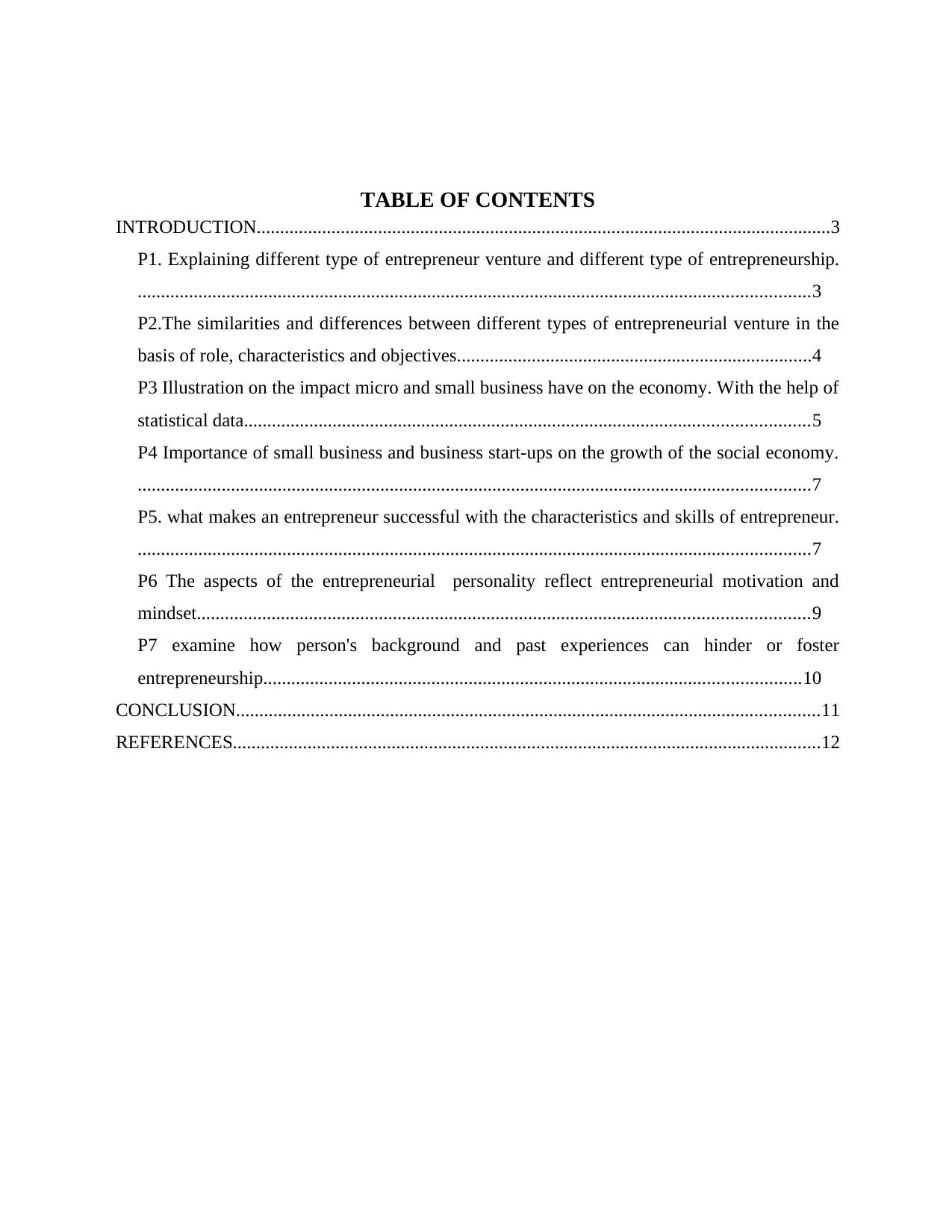
TABLE OF CONTENTS
INTRODUCTION...........................................................................................................................3
P1. Explaining different type of entrepreneur venture and different type of entrepreneurship.
................................................................................................................................................3
P2.The similarities and differences between different types of entrepreneurial venture in the
basis of role, characteristics and objectives............................................................................4
P3 Illustration on the impact micro and small business have on the economy. With the help of
statistical data.........................................................................................................................5
P4 Importance of small business and business start-ups on the growth of the social economy.
................................................................................................................................................7
P5. what makes an entrepreneur successful with the characteristics and skills of entrepreneur.
................................................................................................................................................7
P6 The aspects of the entrepreneurial personality reflect entrepreneurial motivation and
mindset...................................................................................................................................9
P7 examine how person's background and past experiences can hinder or foster
entrepreneurship...................................................................................................................10
CONCLUSION.............................................................................................................................11
REFERENCES..............................................................................................................................12
INTRODUCTION...........................................................................................................................3
P1. Explaining different type of entrepreneur venture and different type of entrepreneurship.
................................................................................................................................................3
P2.The similarities and differences between different types of entrepreneurial venture in the
basis of role, characteristics and objectives............................................................................4
P3 Illustration on the impact micro and small business have on the economy. With the help of
statistical data.........................................................................................................................5
P4 Importance of small business and business start-ups on the growth of the social economy.
................................................................................................................................................7
P5. what makes an entrepreneur successful with the characteristics and skills of entrepreneur.
................................................................................................................................................7
P6 The aspects of the entrepreneurial personality reflect entrepreneurial motivation and
mindset...................................................................................................................................9
P7 examine how person's background and past experiences can hinder or foster
entrepreneurship...................................................................................................................10
CONCLUSION.............................................................................................................................11
REFERENCES..............................................................................................................................12
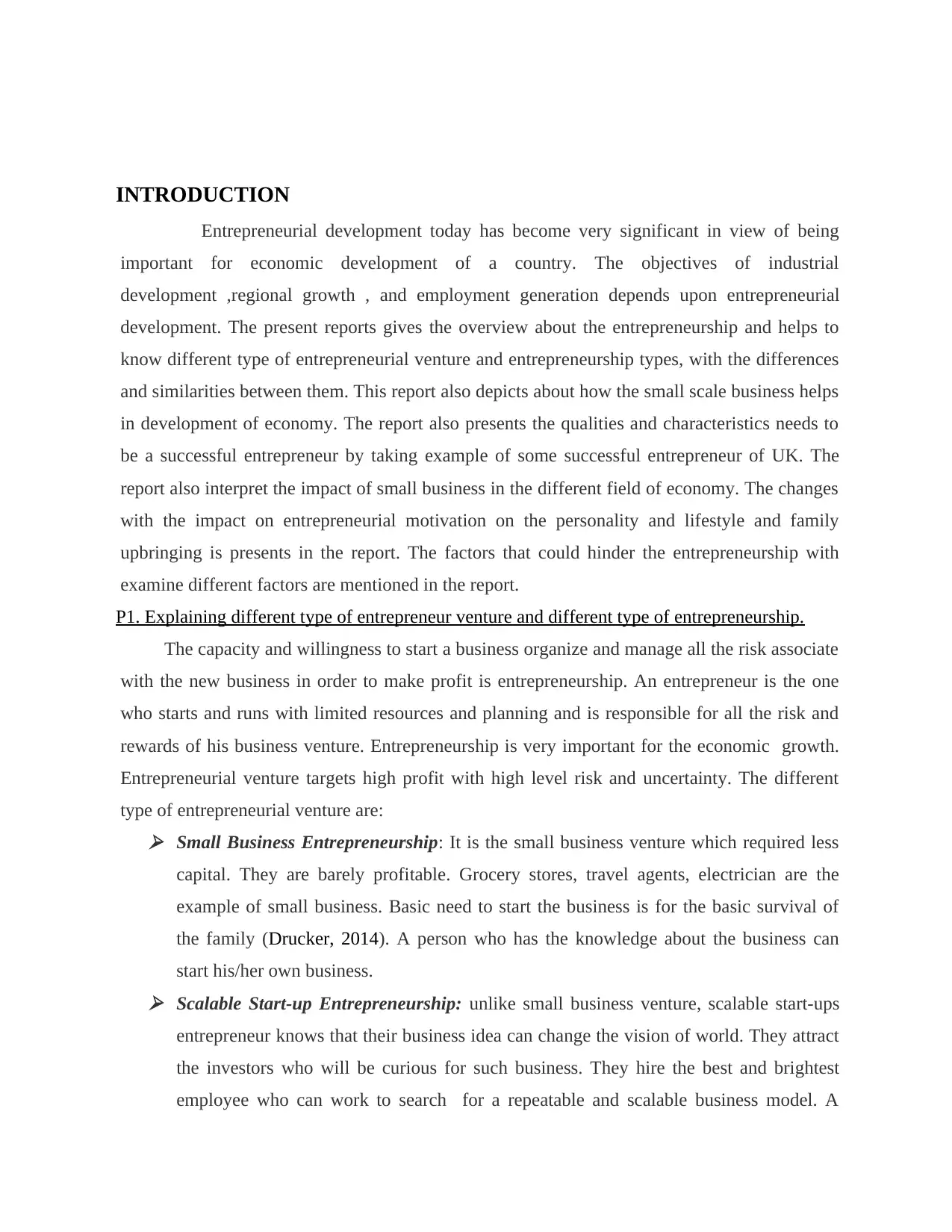
INTRODUCTION
Entrepreneurial development today has become very significant in view of being
important for economic development of a country. The objectives of industrial
development ,regional growth , and employment generation depends upon entrepreneurial
development. The present reports gives the overview about the entrepreneurship and helps to
know different type of entrepreneurial venture and entrepreneurship types, with the differences
and similarities between them. This report also depicts about how the small scale business helps
in development of economy. The report also presents the qualities and characteristics needs to
be a successful entrepreneur by taking example of some successful entrepreneur of UK. The
report also interpret the impact of small business in the different field of economy. The changes
with the impact on entrepreneurial motivation on the personality and lifestyle and family
upbringing is presents in the report. The factors that could hinder the entrepreneurship with
examine different factors are mentioned in the report.
P1. Explaining different type of entrepreneur venture and different type of entrepreneurship.
The capacity and willingness to start a business organize and manage all the risk associate
with the new business in order to make profit is entrepreneurship. An entrepreneur is the one
who starts and runs with limited resources and planning and is responsible for all the risk and
rewards of his business venture. Entrepreneurship is very important for the economic growth.
Entrepreneurial venture targets high profit with high level risk and uncertainty. The different
type of entrepreneurial venture are: Small Business Entrepreneurship: It is the small business venture which required less
capital. They are barely profitable. Grocery stores, travel agents, electrician are the
example of small business. Basic need to start the business is for the basic survival of
the family (Drucker, 2014). A person who has the knowledge about the business can
start his/her own business. Scalable Start-up Entrepreneurship: unlike small business venture, scalable start-ups
entrepreneur knows that their business idea can change the vision of world. They attract
the investors who will be curious for such business. They hire the best and brightest
employee who can work to search for a repeatable and scalable business model. A
Entrepreneurial development today has become very significant in view of being
important for economic development of a country. The objectives of industrial
development ,regional growth , and employment generation depends upon entrepreneurial
development. The present reports gives the overview about the entrepreneurship and helps to
know different type of entrepreneurial venture and entrepreneurship types, with the differences
and similarities between them. This report also depicts about how the small scale business helps
in development of economy. The report also presents the qualities and characteristics needs to
be a successful entrepreneur by taking example of some successful entrepreneur of UK. The
report also interpret the impact of small business in the different field of economy. The changes
with the impact on entrepreneurial motivation on the personality and lifestyle and family
upbringing is presents in the report. The factors that could hinder the entrepreneurship with
examine different factors are mentioned in the report.
P1. Explaining different type of entrepreneur venture and different type of entrepreneurship.
The capacity and willingness to start a business organize and manage all the risk associate
with the new business in order to make profit is entrepreneurship. An entrepreneur is the one
who starts and runs with limited resources and planning and is responsible for all the risk and
rewards of his business venture. Entrepreneurship is very important for the economic growth.
Entrepreneurial venture targets high profit with high level risk and uncertainty. The different
type of entrepreneurial venture are: Small Business Entrepreneurship: It is the small business venture which required less
capital. They are barely profitable. Grocery stores, travel agents, electrician are the
example of small business. Basic need to start the business is for the basic survival of
the family (Drucker, 2014). A person who has the knowledge about the business can
start his/her own business. Scalable Start-up Entrepreneurship: unlike small business venture, scalable start-ups
entrepreneur knows that their business idea can change the vision of world. They attract
the investors who will be curious for such business. They hire the best and brightest
employee who can work to search for a repeatable and scalable business model. A
⊘ This is a preview!⊘
Do you want full access?
Subscribe today to unlock all pages.

Trusted by 1+ million students worldwide
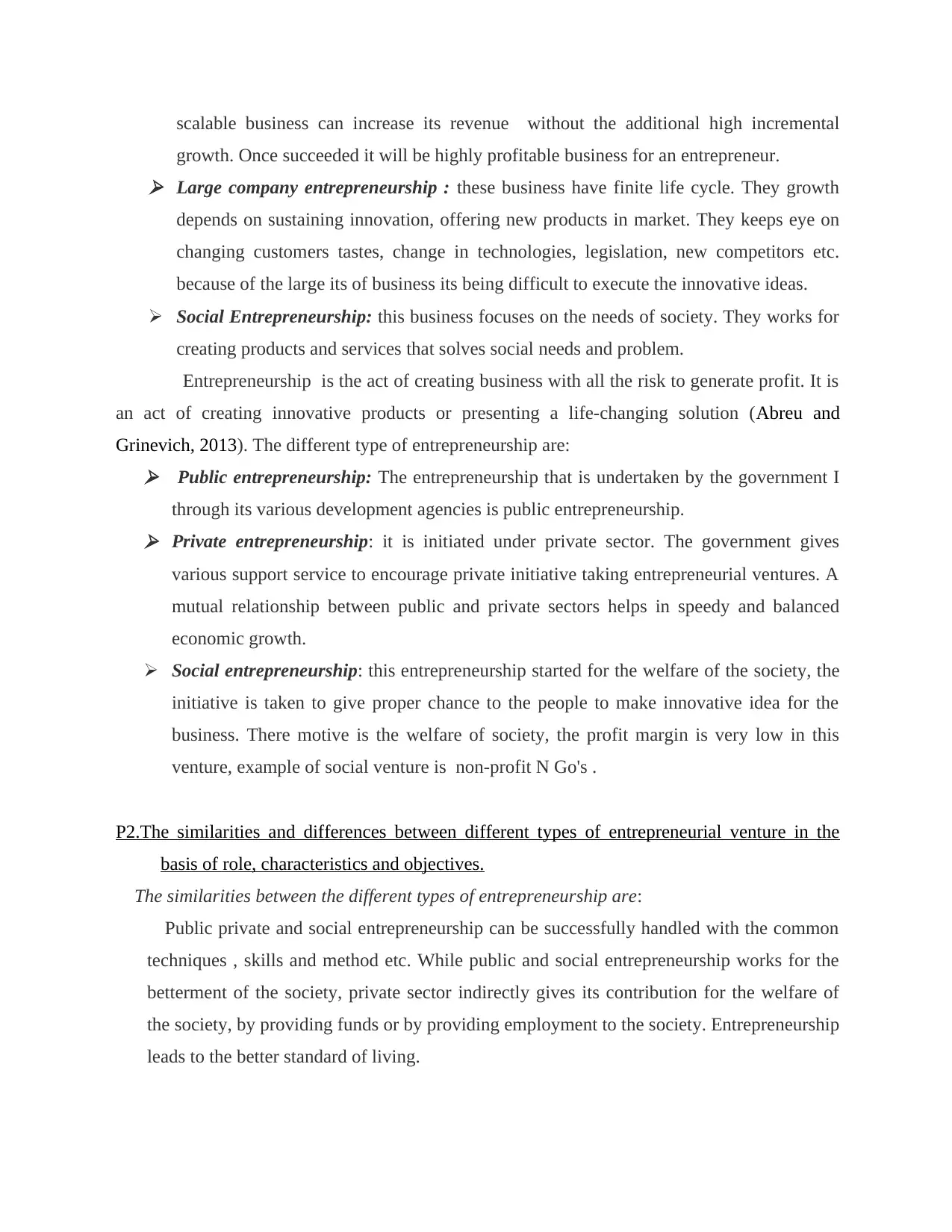
scalable business can increase its revenue without the additional high incremental
growth. Once succeeded it will be highly profitable business for an entrepreneur. Large company entrepreneurship : these business have finite life cycle. They growth
depends on sustaining innovation, offering new products in market. They keeps eye on
changing customers tastes, change in technologies, legislation, new competitors etc.
because of the large its of business its being difficult to execute the innovative ideas.
Social Entrepreneurship: this business focuses on the needs of society. They works for
creating products and services that solves social needs and problem.
Entrepreneurship is the act of creating business with all the risk to generate profit. It is
an act of creating innovative products or presenting a life-changing solution (Abreu and
Grinevich, 2013). The different type of entrepreneurship are: Public entrepreneurship: The entrepreneurship that is undertaken by the government I
through its various development agencies is public entrepreneurship. Private entrepreneurship: it is initiated under private sector. The government gives
various support service to encourage private initiative taking entrepreneurial ventures. A
mutual relationship between public and private sectors helps in speedy and balanced
economic growth.
Social entrepreneurship: this entrepreneurship started for the welfare of the society, the
initiative is taken to give proper chance to the people to make innovative idea for the
business. There motive is the welfare of society, the profit margin is very low in this
venture, example of social venture is non-profit N Go's .
P2.The similarities and differences between different types of entrepreneurial venture in the
basis of role, characteristics and objectives.
The similarities between the different types of entrepreneurship are:
Public private and social entrepreneurship can be successfully handled with the common
techniques , skills and method etc. While public and social entrepreneurship works for the
betterment of the society, private sector indirectly gives its contribution for the welfare of
the society, by providing funds or by providing employment to the society. Entrepreneurship
leads to the better standard of living.
growth. Once succeeded it will be highly profitable business for an entrepreneur. Large company entrepreneurship : these business have finite life cycle. They growth
depends on sustaining innovation, offering new products in market. They keeps eye on
changing customers tastes, change in technologies, legislation, new competitors etc.
because of the large its of business its being difficult to execute the innovative ideas.
Social Entrepreneurship: this business focuses on the needs of society. They works for
creating products and services that solves social needs and problem.
Entrepreneurship is the act of creating business with all the risk to generate profit. It is
an act of creating innovative products or presenting a life-changing solution (Abreu and
Grinevich, 2013). The different type of entrepreneurship are: Public entrepreneurship: The entrepreneurship that is undertaken by the government I
through its various development agencies is public entrepreneurship. Private entrepreneurship: it is initiated under private sector. The government gives
various support service to encourage private initiative taking entrepreneurial ventures. A
mutual relationship between public and private sectors helps in speedy and balanced
economic growth.
Social entrepreneurship: this entrepreneurship started for the welfare of the society, the
initiative is taken to give proper chance to the people to make innovative idea for the
business. There motive is the welfare of society, the profit margin is very low in this
venture, example of social venture is non-profit N Go's .
P2.The similarities and differences between different types of entrepreneurial venture in the
basis of role, characteristics and objectives.
The similarities between the different types of entrepreneurship are:
Public private and social entrepreneurship can be successfully handled with the common
techniques , skills and method etc. While public and social entrepreneurship works for the
betterment of the society, private sector indirectly gives its contribution for the welfare of
the society, by providing funds or by providing employment to the society. Entrepreneurship
leads to the better standard of living.
Paraphrase This Document
Need a fresh take? Get an instant paraphrase of this document with our AI Paraphraser
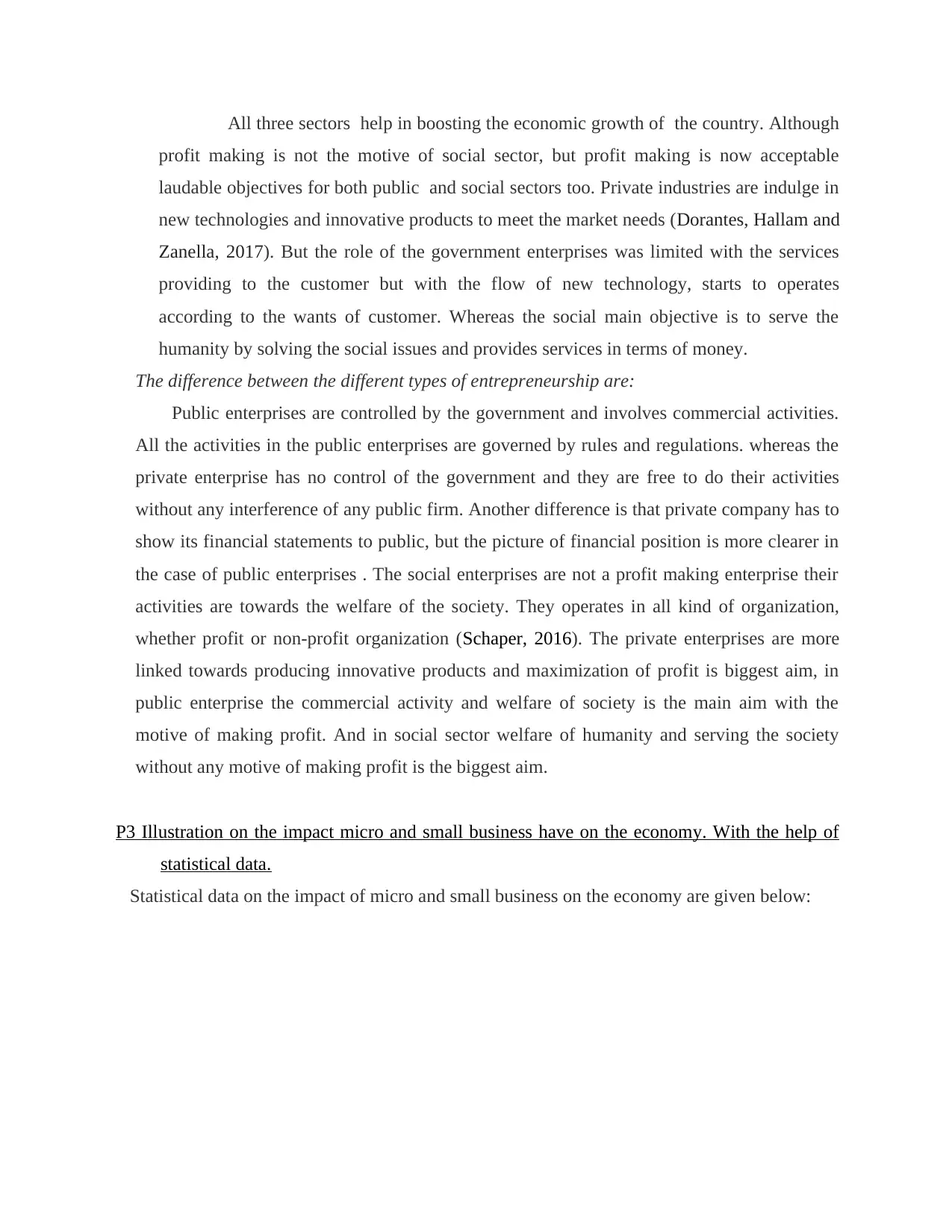
All three sectors help in boosting the economic growth of the country. Although
profit making is not the motive of social sector, but profit making is now acceptable
laudable objectives for both public and social sectors too. Private industries are indulge in
new technologies and innovative products to meet the market needs (Dorantes, Hallam and
Zanella, 2017). But the role of the government enterprises was limited with the services
providing to the customer but with the flow of new technology, starts to operates
according to the wants of customer. Whereas the social main objective is to serve the
humanity by solving the social issues and provides services in terms of money.
The difference between the different types of entrepreneurship are:
Public enterprises are controlled by the government and involves commercial activities.
All the activities in the public enterprises are governed by rules and regulations. whereas the
private enterprise has no control of the government and they are free to do their activities
without any interference of any public firm. Another difference is that private company has to
show its financial statements to public, but the picture of financial position is more clearer in
the case of public enterprises . The social enterprises are not a profit making enterprise their
activities are towards the welfare of the society. They operates in all kind of organization,
whether profit or non-profit organization (Schaper, 2016). The private enterprises are more
linked towards producing innovative products and maximization of profit is biggest aim, in
public enterprise the commercial activity and welfare of society is the main aim with the
motive of making profit. And in social sector welfare of humanity and serving the society
without any motive of making profit is the biggest aim.
P3 Illustration on the impact micro and small business have on the economy. With the help of
statistical data.
Statistical data on the impact of micro and small business on the economy are given below:
profit making is not the motive of social sector, but profit making is now acceptable
laudable objectives for both public and social sectors too. Private industries are indulge in
new technologies and innovative products to meet the market needs (Dorantes, Hallam and
Zanella, 2017). But the role of the government enterprises was limited with the services
providing to the customer but with the flow of new technology, starts to operates
according to the wants of customer. Whereas the social main objective is to serve the
humanity by solving the social issues and provides services in terms of money.
The difference between the different types of entrepreneurship are:
Public enterprises are controlled by the government and involves commercial activities.
All the activities in the public enterprises are governed by rules and regulations. whereas the
private enterprise has no control of the government and they are free to do their activities
without any interference of any public firm. Another difference is that private company has to
show its financial statements to public, but the picture of financial position is more clearer in
the case of public enterprises . The social enterprises are not a profit making enterprise their
activities are towards the welfare of the society. They operates in all kind of organization,
whether profit or non-profit organization (Schaper, 2016). The private enterprises are more
linked towards producing innovative products and maximization of profit is biggest aim, in
public enterprise the commercial activity and welfare of society is the main aim with the
motive of making profit. And in social sector welfare of humanity and serving the society
without any motive of making profit is the biggest aim.
P3 Illustration on the impact micro and small business have on the economy. With the help of
statistical data.
Statistical data on the impact of micro and small business on the economy are given below:
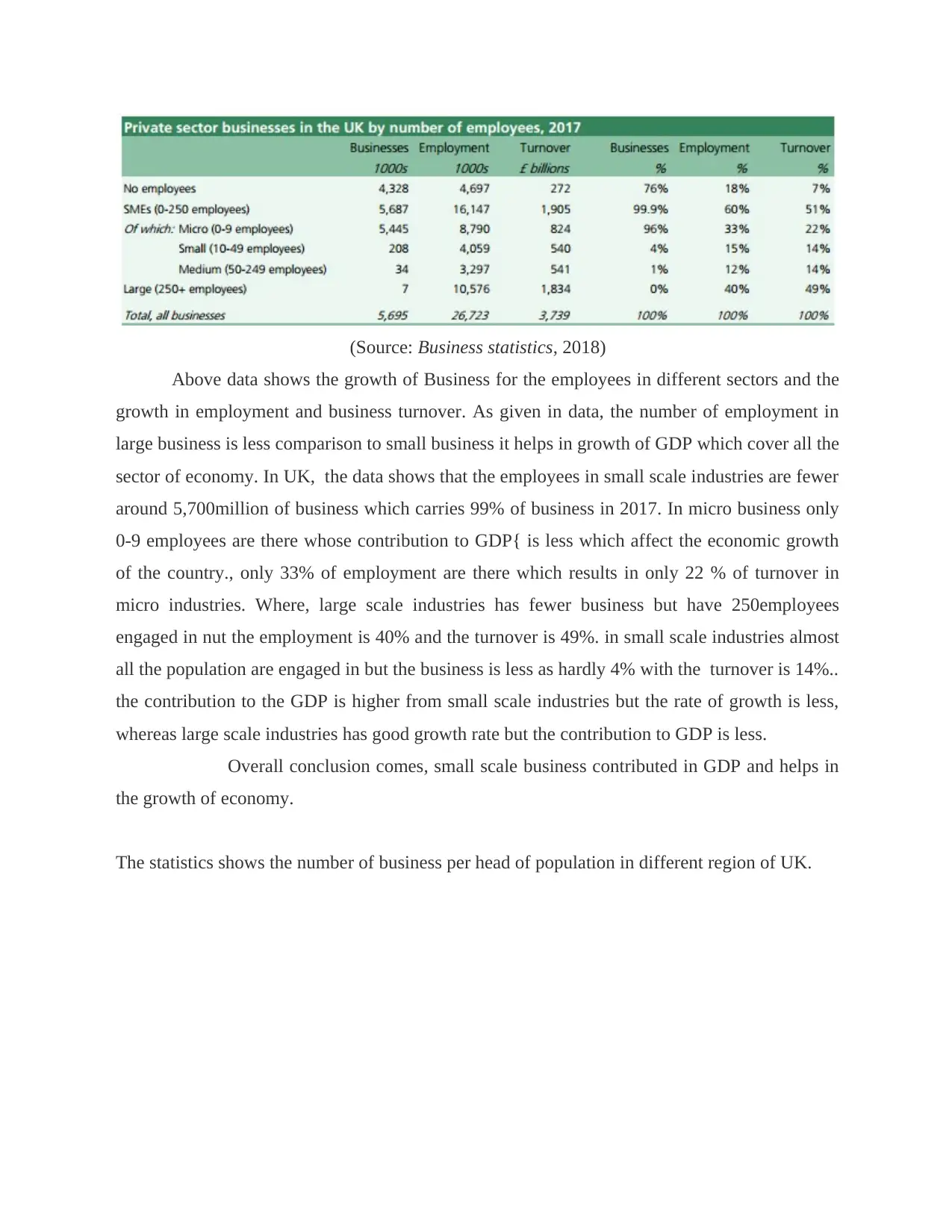
(Source: Business statistics, 2018)
Above data shows the growth of Business for the employees in different sectors and the
growth in employment and business turnover. As given in data, the number of employment in
large business is less comparison to small business it helps in growth of GDP which cover all the
sector of economy. In UK, the data shows that the employees in small scale industries are fewer
around 5,700million of business which carries 99% of business in 2017. In micro business only
0-9 employees are there whose contribution to GDP{ is less which affect the economic growth
of the country., only 33% of employment are there which results in only 22 % of turnover in
micro industries. Where, large scale industries has fewer business but have 250employees
engaged in nut the employment is 40% and the turnover is 49%. in small scale industries almost
all the population are engaged in but the business is less as hardly 4% with the turnover is 14%..
the contribution to the GDP is higher from small scale industries but the rate of growth is less,
whereas large scale industries has good growth rate but the contribution to GDP is less.
Overall conclusion comes, small scale business contributed in GDP and helps in
the growth of economy.
The statistics shows the number of business per head of population in different region of UK.
Above data shows the growth of Business for the employees in different sectors and the
growth in employment and business turnover. As given in data, the number of employment in
large business is less comparison to small business it helps in growth of GDP which cover all the
sector of economy. In UK, the data shows that the employees in small scale industries are fewer
around 5,700million of business which carries 99% of business in 2017. In micro business only
0-9 employees are there whose contribution to GDP{ is less which affect the economic growth
of the country., only 33% of employment are there which results in only 22 % of turnover in
micro industries. Where, large scale industries has fewer business but have 250employees
engaged in nut the employment is 40% and the turnover is 49%. in small scale industries almost
all the population are engaged in but the business is less as hardly 4% with the turnover is 14%..
the contribution to the GDP is higher from small scale industries but the rate of growth is less,
whereas large scale industries has good growth rate but the contribution to GDP is less.
Overall conclusion comes, small scale business contributed in GDP and helps in
the growth of economy.
The statistics shows the number of business per head of population in different region of UK.
⊘ This is a preview!⊘
Do you want full access?
Subscribe today to unlock all pages.

Trusted by 1+ million students worldwide

(Source: Business statistics, 2018)
The above data shows that in 2017 in UK there was 1069 business per 10,000 residents
adults. The table shows that the third of business in London or in South East, northern Ireland
and north east are higher which means that the contribution on the GDP is higher from this
region as compared to the region such as Wales saw fall in business number but the UK overall
saw the increase in business by 4% which leads to increase in the economic growth of the
country.
P4 Importance of small business and business start-ups on the growth of the social economy.
Small sized business and micro enterprises(SMEs) accounts for 99 % of UK business.
They provide two thirds of private sector jobs and contribute more than half of the GDP to UK
economy. SMEs have an important role in economy. Start-ups , generally small businesses or
micro-enterprises, are the primary source of job creation in many countries. The role and
importance of small scale and business starts up on the growth of social economy are: Creates Job: two out of three new net private sector jobs are created by small business.
The new start-ups business needs employees which gives various job opportunities in the
society. The job creation by new and existing business again is again the basic goals of
the economic development. Small scale operates locally, which gives jobs to local people
and helps in the development of the small cities. Wealth Creation:by establishing a business entity, entrepreneur invest their own
resources and attract capital from investors, lenders and the public. This helps in the
mobilization of the wealth of public and allows people to make profit from the success of
The above data shows that in 2017 in UK there was 1069 business per 10,000 residents
adults. The table shows that the third of business in London or in South East, northern Ireland
and north east are higher which means that the contribution on the GDP is higher from this
region as compared to the region such as Wales saw fall in business number but the UK overall
saw the increase in business by 4% which leads to increase in the economic growth of the
country.
P4 Importance of small business and business start-ups on the growth of the social economy.
Small sized business and micro enterprises(SMEs) accounts for 99 % of UK business.
They provide two thirds of private sector jobs and contribute more than half of the GDP to UK
economy. SMEs have an important role in economy. Start-ups , generally small businesses or
micro-enterprises, are the primary source of job creation in many countries. The role and
importance of small scale and business starts up on the growth of social economy are: Creates Job: two out of three new net private sector jobs are created by small business.
The new start-ups business needs employees which gives various job opportunities in the
society. The job creation by new and existing business again is again the basic goals of
the economic development. Small scale operates locally, which gives jobs to local people
and helps in the development of the small cities. Wealth Creation:by establishing a business entity, entrepreneur invest their own
resources and attract capital from investors, lenders and the public. This helps in the
mobilization of the wealth of public and allows people to make profit from the success of
Paraphrase This Document
Need a fresh take? Get an instant paraphrase of this document with our AI Paraphraser
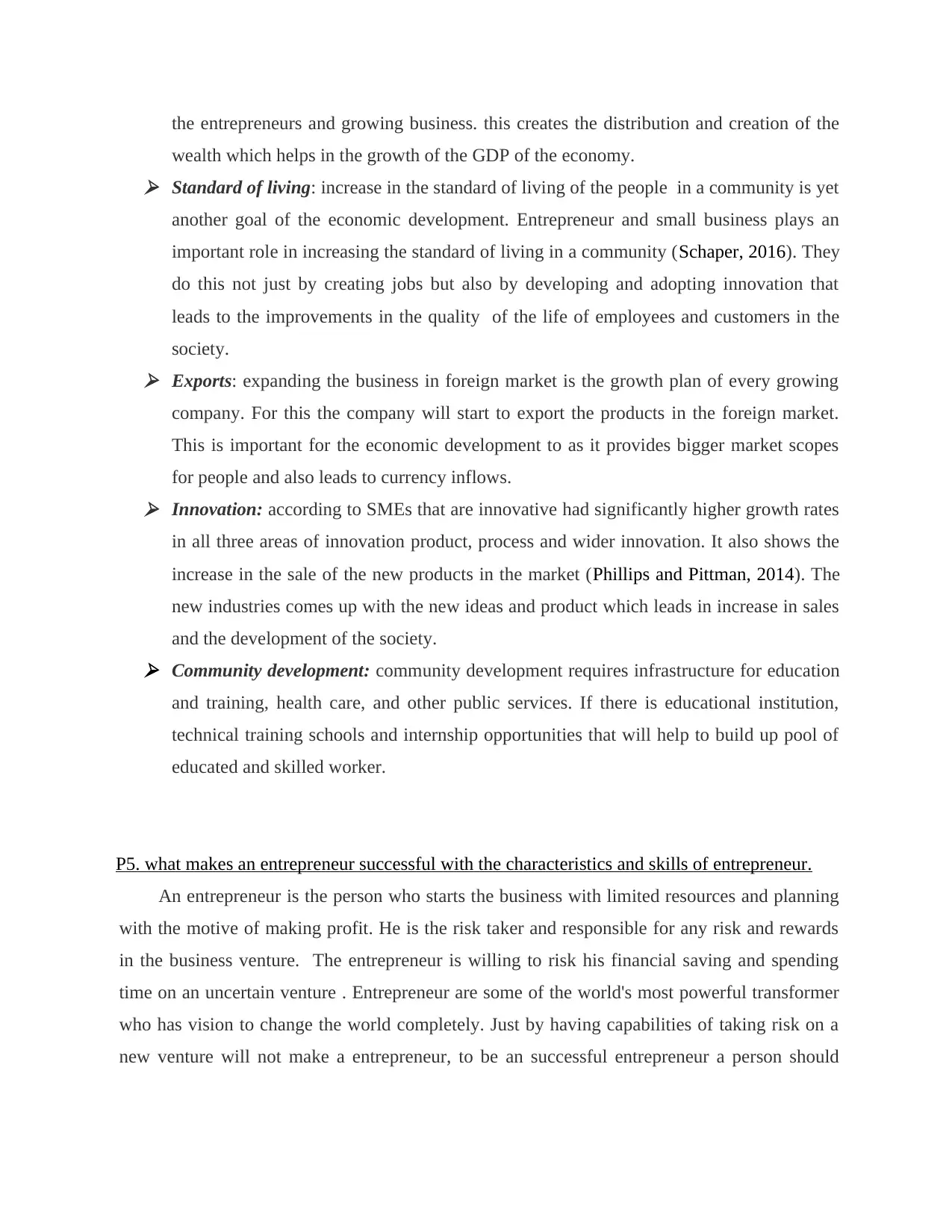
the entrepreneurs and growing business. this creates the distribution and creation of the
wealth which helps in the growth of the GDP of the economy. Standard of living: increase in the standard of living of the people in a community is yet
another goal of the economic development. Entrepreneur and small business plays an
important role in increasing the standard of living in a community (Schaper, 2016). They
do this not just by creating jobs but also by developing and adopting innovation that
leads to the improvements in the quality of the life of employees and customers in the
society. Exports: expanding the business in foreign market is the growth plan of every growing
company. For this the company will start to export the products in the foreign market.
This is important for the economic development to as it provides bigger market scopes
for people and also leads to currency inflows. Innovation: according to SMEs that are innovative had significantly higher growth rates
in all three areas of innovation product, process and wider innovation. It also shows the
increase in the sale of the new products in the market (Phillips and Pittman, 2014). The
new industries comes up with the new ideas and product which leads in increase in sales
and the development of the society. Community development: community development requires infrastructure for education
and training, health care, and other public services. If there is educational institution,
technical training schools and internship opportunities that will help to build up pool of
educated and skilled worker.
P5. what makes an entrepreneur successful with the characteristics and skills of entrepreneur.
An entrepreneur is the person who starts the business with limited resources and planning
with the motive of making profit. He is the risk taker and responsible for any risk and rewards
in the business venture. The entrepreneur is willing to risk his financial saving and spending
time on an uncertain venture . Entrepreneur are some of the world's most powerful transformer
who has vision to change the world completely. Just by having capabilities of taking risk on a
new venture will not make a entrepreneur, to be an successful entrepreneur a person should
wealth which helps in the growth of the GDP of the economy. Standard of living: increase in the standard of living of the people in a community is yet
another goal of the economic development. Entrepreneur and small business plays an
important role in increasing the standard of living in a community (Schaper, 2016). They
do this not just by creating jobs but also by developing and adopting innovation that
leads to the improvements in the quality of the life of employees and customers in the
society. Exports: expanding the business in foreign market is the growth plan of every growing
company. For this the company will start to export the products in the foreign market.
This is important for the economic development to as it provides bigger market scopes
for people and also leads to currency inflows. Innovation: according to SMEs that are innovative had significantly higher growth rates
in all three areas of innovation product, process and wider innovation. It also shows the
increase in the sale of the new products in the market (Phillips and Pittman, 2014). The
new industries comes up with the new ideas and product which leads in increase in sales
and the development of the society. Community development: community development requires infrastructure for education
and training, health care, and other public services. If there is educational institution,
technical training schools and internship opportunities that will help to build up pool of
educated and skilled worker.
P5. what makes an entrepreneur successful with the characteristics and skills of entrepreneur.
An entrepreneur is the person who starts the business with limited resources and planning
with the motive of making profit. He is the risk taker and responsible for any risk and rewards
in the business venture. The entrepreneur is willing to risk his financial saving and spending
time on an uncertain venture . Entrepreneur are some of the world's most powerful transformer
who has vision to change the world completely. Just by having capabilities of taking risk on a
new venture will not make a entrepreneur, to be an successful entrepreneur a person should
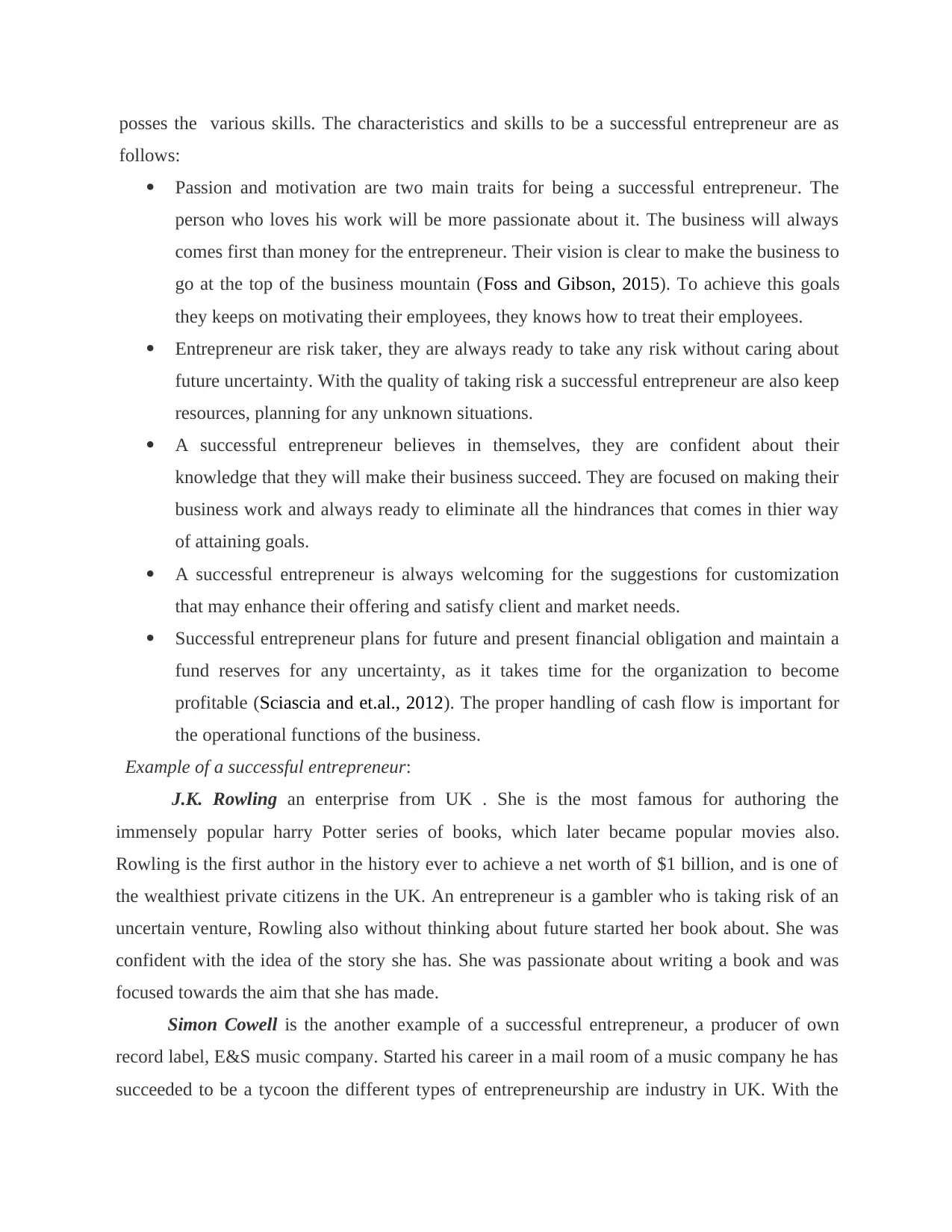
posses the various skills. The characteristics and skills to be a successful entrepreneur are as
follows:
Passion and motivation are two main traits for being a successful entrepreneur. The
person who loves his work will be more passionate about it. The business will always
comes first than money for the entrepreneur. Their vision is clear to make the business to
go at the top of the business mountain (Foss and Gibson, 2015). To achieve this goals
they keeps on motivating their employees, they knows how to treat their employees.
Entrepreneur are risk taker, they are always ready to take any risk without caring about
future uncertainty. With the quality of taking risk a successful entrepreneur are also keep
resources, planning for any unknown situations.
A successful entrepreneur believes in themselves, they are confident about their
knowledge that they will make their business succeed. They are focused on making their
business work and always ready to eliminate all the hindrances that comes in thier way
of attaining goals.
A successful entrepreneur is always welcoming for the suggestions for customization
that may enhance their offering and satisfy client and market needs.
Successful entrepreneur plans for future and present financial obligation and maintain a
fund reserves for any uncertainty, as it takes time for the organization to become
profitable (Sciascia and et.al., 2012). The proper handling of cash flow is important for
the operational functions of the business.
Example of a successful entrepreneur:
J.K. Rowling an enterprise from UK . She is the most famous for authoring the
immensely popular harry Potter series of books, which later became popular movies also.
Rowling is the first author in the history ever to achieve a net worth of $1 billion, and is one of
the wealthiest private citizens in the UK. An entrepreneur is a gambler who is taking risk of an
uncertain venture, Rowling also without thinking about future started her book about. She was
confident with the idea of the story she has. She was passionate about writing a book and was
focused towards the aim that she has made.
Simon Cowell is the another example of a successful entrepreneur, a producer of own
record label, E&S music company. Started his career in a mail room of a music company he has
succeeded to be a tycoon the different types of entrepreneurship are industry in UK. With the
follows:
Passion and motivation are two main traits for being a successful entrepreneur. The
person who loves his work will be more passionate about it. The business will always
comes first than money for the entrepreneur. Their vision is clear to make the business to
go at the top of the business mountain (Foss and Gibson, 2015). To achieve this goals
they keeps on motivating their employees, they knows how to treat their employees.
Entrepreneur are risk taker, they are always ready to take any risk without caring about
future uncertainty. With the quality of taking risk a successful entrepreneur are also keep
resources, planning for any unknown situations.
A successful entrepreneur believes in themselves, they are confident about their
knowledge that they will make their business succeed. They are focused on making their
business work and always ready to eliminate all the hindrances that comes in thier way
of attaining goals.
A successful entrepreneur is always welcoming for the suggestions for customization
that may enhance their offering and satisfy client and market needs.
Successful entrepreneur plans for future and present financial obligation and maintain a
fund reserves for any uncertainty, as it takes time for the organization to become
profitable (Sciascia and et.al., 2012). The proper handling of cash flow is important for
the operational functions of the business.
Example of a successful entrepreneur:
J.K. Rowling an enterprise from UK . She is the most famous for authoring the
immensely popular harry Potter series of books, which later became popular movies also.
Rowling is the first author in the history ever to achieve a net worth of $1 billion, and is one of
the wealthiest private citizens in the UK. An entrepreneur is a gambler who is taking risk of an
uncertain venture, Rowling also without thinking about future started her book about. She was
confident with the idea of the story she has. She was passionate about writing a book and was
focused towards the aim that she has made.
Simon Cowell is the another example of a successful entrepreneur, a producer of own
record label, E&S music company. Started his career in a mail room of a music company he has
succeeded to be a tycoon the different types of entrepreneurship are industry in UK. With the
⊘ This is a preview!⊘
Do you want full access?
Subscribe today to unlock all pages.

Trusted by 1+ million students worldwide
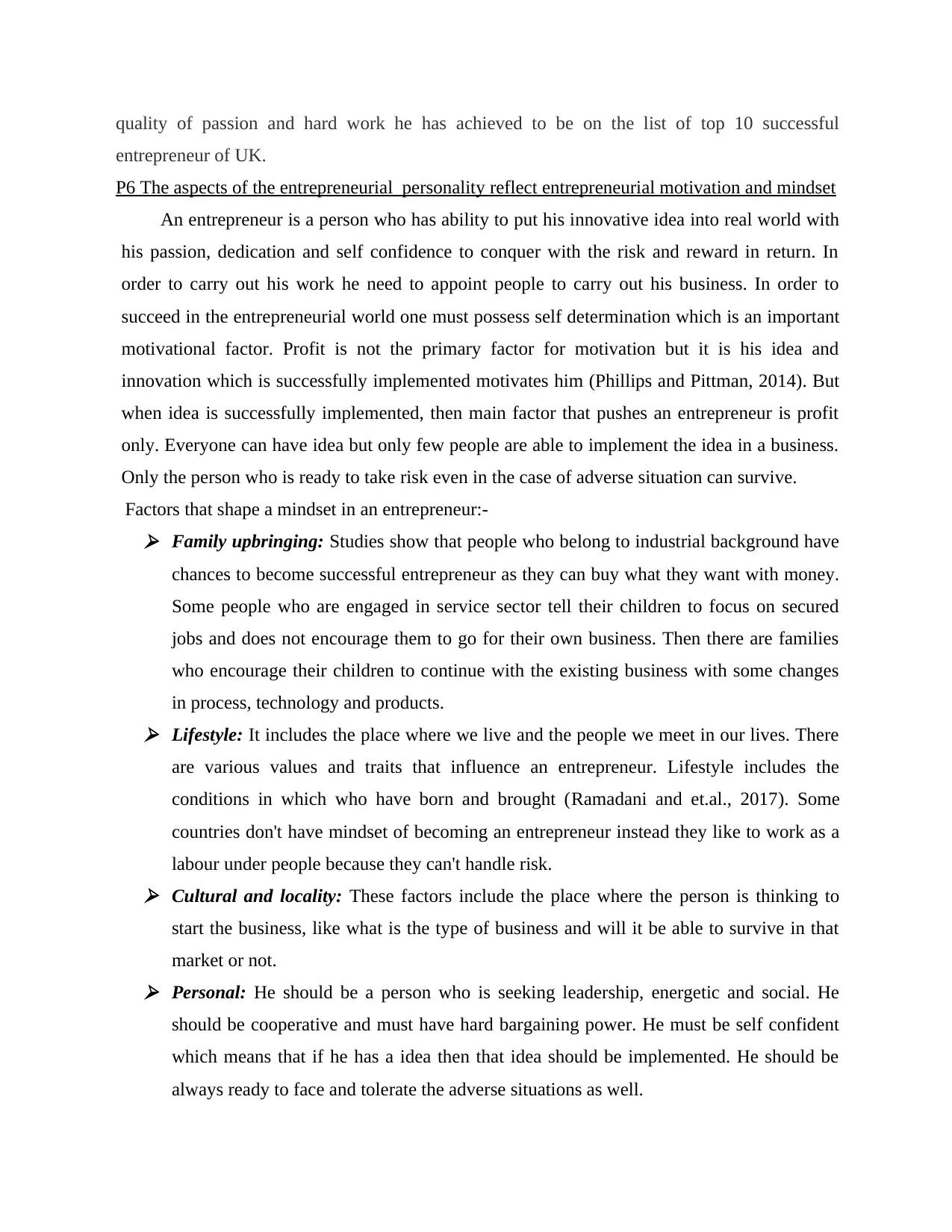
quality of passion and hard work he has achieved to be on the list of top 10 successful
entrepreneur of UK.
P6 The aspects of the entrepreneurial personality reflect entrepreneurial motivation and mindset
An entrepreneur is a person who has ability to put his innovative idea into real world with
his passion, dedication and self confidence to conquer with the risk and reward in return. In
order to carry out his work he need to appoint people to carry out his business. In order to
succeed in the entrepreneurial world one must possess self determination which is an important
motivational factor. Profit is not the primary factor for motivation but it is his idea and
innovation which is successfully implemented motivates him (Phillips and Pittman, 2014). But
when idea is successfully implemented, then main factor that pushes an entrepreneur is profit
only. Everyone can have idea but only few people are able to implement the idea in a business.
Only the person who is ready to take risk even in the case of adverse situation can survive.
Factors that shape a mindset in an entrepreneur:- Family upbringing: Studies show that people who belong to industrial background have
chances to become successful entrepreneur as they can buy what they want with money.
Some people who are engaged in service sector tell their children to focus on secured
jobs and does not encourage them to go for their own business. Then there are families
who encourage their children to continue with the existing business with some changes
in process, technology and products. Lifestyle: It includes the place where we live and the people we meet in our lives. There
are various values and traits that influence an entrepreneur. Lifestyle includes the
conditions in which who have born and brought (Ramadani and et.al., 2017). Some
countries don't have mindset of becoming an entrepreneur instead they like to work as a
labour under people because they can't handle risk. Cultural and locality: These factors include the place where the person is thinking to
start the business, like what is the type of business and will it be able to survive in that
market or not. Personal: He should be a person who is seeking leadership, energetic and social. He
should be cooperative and must have hard bargaining power. He must be self confident
which means that if he has a idea then that idea should be implemented. He should be
always ready to face and tolerate the adverse situations as well.
entrepreneur of UK.
P6 The aspects of the entrepreneurial personality reflect entrepreneurial motivation and mindset
An entrepreneur is a person who has ability to put his innovative idea into real world with
his passion, dedication and self confidence to conquer with the risk and reward in return. In
order to carry out his work he need to appoint people to carry out his business. In order to
succeed in the entrepreneurial world one must possess self determination which is an important
motivational factor. Profit is not the primary factor for motivation but it is his idea and
innovation which is successfully implemented motivates him (Phillips and Pittman, 2014). But
when idea is successfully implemented, then main factor that pushes an entrepreneur is profit
only. Everyone can have idea but only few people are able to implement the idea in a business.
Only the person who is ready to take risk even in the case of adverse situation can survive.
Factors that shape a mindset in an entrepreneur:- Family upbringing: Studies show that people who belong to industrial background have
chances to become successful entrepreneur as they can buy what they want with money.
Some people who are engaged in service sector tell their children to focus on secured
jobs and does not encourage them to go for their own business. Then there are families
who encourage their children to continue with the existing business with some changes
in process, technology and products. Lifestyle: It includes the place where we live and the people we meet in our lives. There
are various values and traits that influence an entrepreneur. Lifestyle includes the
conditions in which who have born and brought (Ramadani and et.al., 2017). Some
countries don't have mindset of becoming an entrepreneur instead they like to work as a
labour under people because they can't handle risk. Cultural and locality: These factors include the place where the person is thinking to
start the business, like what is the type of business and will it be able to survive in that
market or not. Personal: He should be a person who is seeking leadership, energetic and social. He
should be cooperative and must have hard bargaining power. He must be self confident
which means that if he has a idea then that idea should be implemented. He should be
always ready to face and tolerate the adverse situations as well.
Paraphrase This Document
Need a fresh take? Get an instant paraphrase of this document with our AI Paraphraser
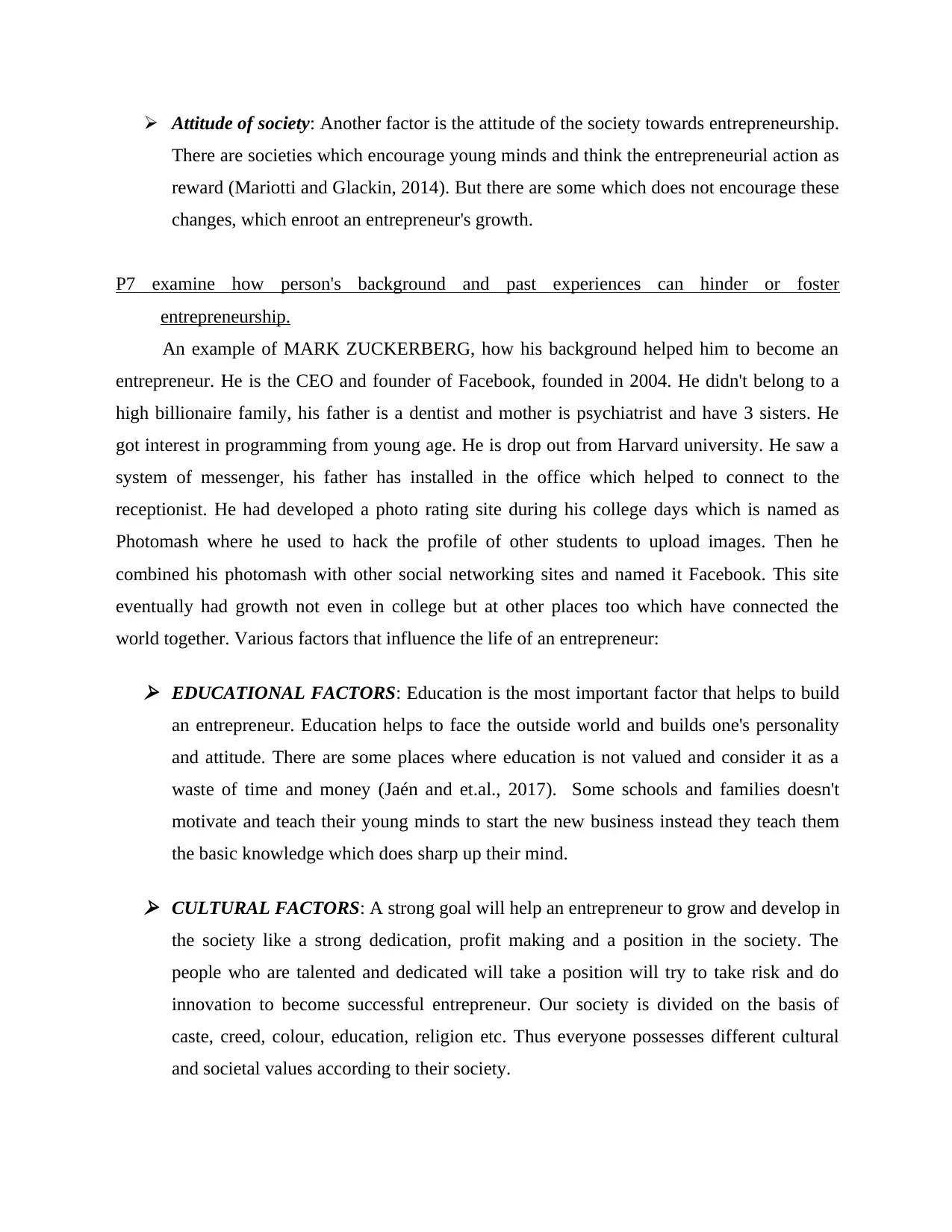
Attitude of society: Another factor is the attitude of the society towards entrepreneurship.
There are societies which encourage young minds and think the entrepreneurial action as
reward (Mariotti and Glackin, 2014). But there are some which does not encourage these
changes, which enroot an entrepreneur's growth.
P7 examine how person's background and past experiences can hinder or foster
entrepreneurship.
An example of MARK ZUCKERBERG, how his background helped him to become an
entrepreneur. He is the CEO and founder of Facebook, founded in 2004. He didn't belong to a
high billionaire family, his father is a dentist and mother is psychiatrist and have 3 sisters. He
got interest in programming from young age. He is drop out from Harvard university. He saw a
system of messenger, his father has installed in the office which helped to connect to the
receptionist. He had developed a photo rating site during his college days which is named as
Photomash where he used to hack the profile of other students to upload images. Then he
combined his photomash with other social networking sites and named it Facebook. This site
eventually had growth not even in college but at other places too which have connected the
world together. Various factors that influence the life of an entrepreneur:
EDUCATIONAL FACTORS: Education is the most important factor that helps to build
an entrepreneur. Education helps to face the outside world and builds one's personality
and attitude. There are some places where education is not valued and consider it as a
waste of time and money (Jaén and et.al., 2017). Some schools and families doesn't
motivate and teach their young minds to start the new business instead they teach them
the basic knowledge which does sharp up their mind.
CULTURAL FACTORS: A strong goal will help an entrepreneur to grow and develop in
the society like a strong dedication, profit making and a position in the society. The
people who are talented and dedicated will take a position will try to take risk and do
innovation to become successful entrepreneur. Our society is divided on the basis of
caste, creed, colour, education, religion etc. Thus everyone possesses different cultural
and societal values according to their society.
There are societies which encourage young minds and think the entrepreneurial action as
reward (Mariotti and Glackin, 2014). But there are some which does not encourage these
changes, which enroot an entrepreneur's growth.
P7 examine how person's background and past experiences can hinder or foster
entrepreneurship.
An example of MARK ZUCKERBERG, how his background helped him to become an
entrepreneur. He is the CEO and founder of Facebook, founded in 2004. He didn't belong to a
high billionaire family, his father is a dentist and mother is psychiatrist and have 3 sisters. He
got interest in programming from young age. He is drop out from Harvard university. He saw a
system of messenger, his father has installed in the office which helped to connect to the
receptionist. He had developed a photo rating site during his college days which is named as
Photomash where he used to hack the profile of other students to upload images. Then he
combined his photomash with other social networking sites and named it Facebook. This site
eventually had growth not even in college but at other places too which have connected the
world together. Various factors that influence the life of an entrepreneur:
EDUCATIONAL FACTORS: Education is the most important factor that helps to build
an entrepreneur. Education helps to face the outside world and builds one's personality
and attitude. There are some places where education is not valued and consider it as a
waste of time and money (Jaén and et.al., 2017). Some schools and families doesn't
motivate and teach their young minds to start the new business instead they teach them
the basic knowledge which does sharp up their mind.
CULTURAL FACTORS: A strong goal will help an entrepreneur to grow and develop in
the society like a strong dedication, profit making and a position in the society. The
people who are talented and dedicated will take a position will try to take risk and do
innovation to become successful entrepreneur. Our society is divided on the basis of
caste, creed, colour, education, religion etc. Thus everyone possesses different cultural
and societal values according to their society.
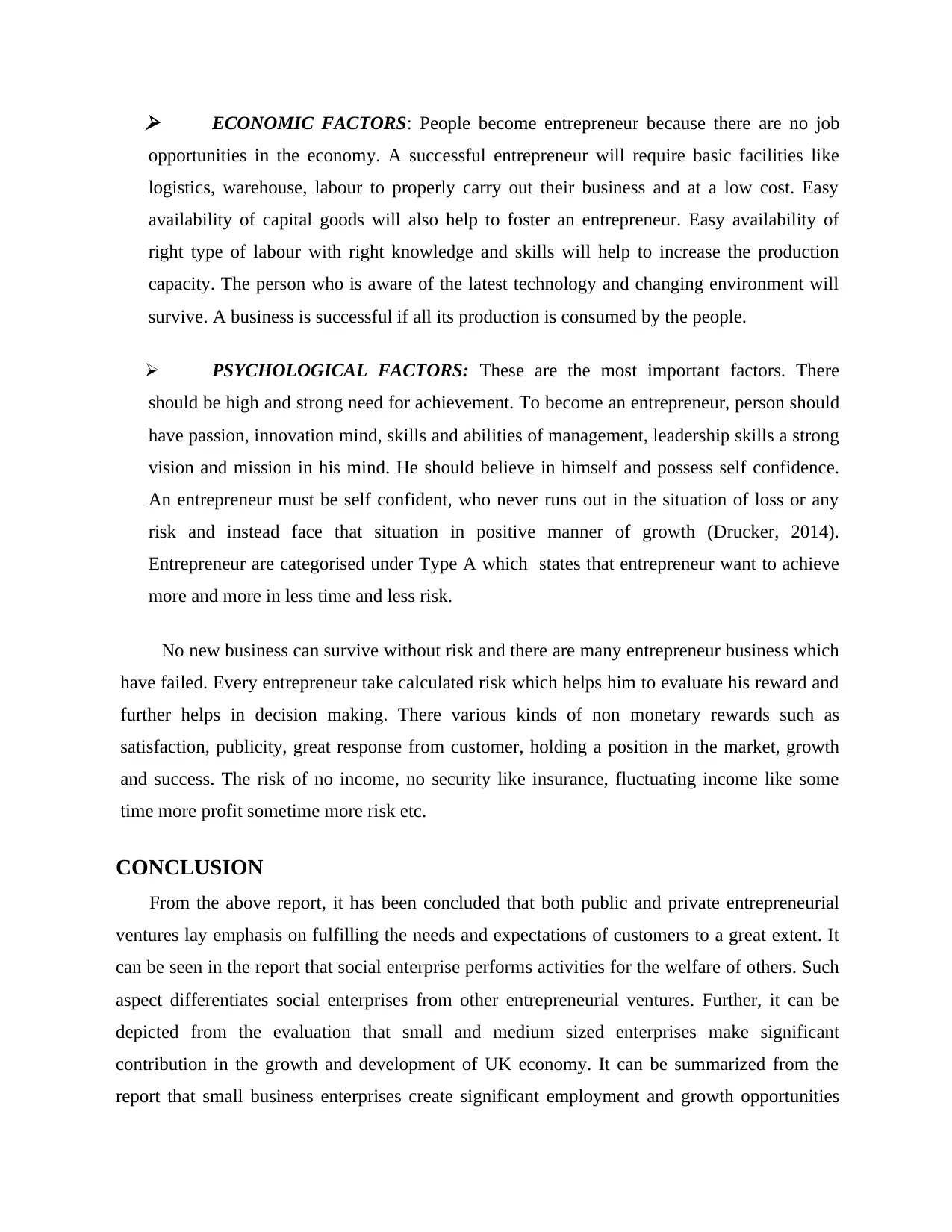
ECONOMIC FACTORS: People become entrepreneur because there are no job
opportunities in the economy. A successful entrepreneur will require basic facilities like
logistics, warehouse, labour to properly carry out their business and at a low cost. Easy
availability of capital goods will also help to foster an entrepreneur. Easy availability of
right type of labour with right knowledge and skills will help to increase the production
capacity. The person who is aware of the latest technology and changing environment will
survive. A business is successful if all its production is consumed by the people.
PSYCHOLOGICAL FACTORS: These are the most important factors. There
should be high and strong need for achievement. To become an entrepreneur, person should
have passion, innovation mind, skills and abilities of management, leadership skills a strong
vision and mission in his mind. He should believe in himself and possess self confidence.
An entrepreneur must be self confident, who never runs out in the situation of loss or any
risk and instead face that situation in positive manner of growth (Drucker, 2014).
Entrepreneur are categorised under Type A which states that entrepreneur want to achieve
more and more in less time and less risk.
No new business can survive without risk and there are many entrepreneur business which
have failed. Every entrepreneur take calculated risk which helps him to evaluate his reward and
further helps in decision making. There various kinds of non monetary rewards such as
satisfaction, publicity, great response from customer, holding a position in the market, growth
and success. The risk of no income, no security like insurance, fluctuating income like some
time more profit sometime more risk etc.
CONCLUSION
From the above report, it has been concluded that both public and private entrepreneurial
ventures lay emphasis on fulfilling the needs and expectations of customers to a great extent. It
can be seen in the report that social enterprise performs activities for the welfare of others. Such
aspect differentiates social enterprises from other entrepreneurial ventures. Further, it can be
depicted from the evaluation that small and medium sized enterprises make significant
contribution in the growth and development of UK economy. It can be summarized from the
report that small business enterprises create significant employment and growth opportunities
opportunities in the economy. A successful entrepreneur will require basic facilities like
logistics, warehouse, labour to properly carry out their business and at a low cost. Easy
availability of capital goods will also help to foster an entrepreneur. Easy availability of
right type of labour with right knowledge and skills will help to increase the production
capacity. The person who is aware of the latest technology and changing environment will
survive. A business is successful if all its production is consumed by the people.
PSYCHOLOGICAL FACTORS: These are the most important factors. There
should be high and strong need for achievement. To become an entrepreneur, person should
have passion, innovation mind, skills and abilities of management, leadership skills a strong
vision and mission in his mind. He should believe in himself and possess self confidence.
An entrepreneur must be self confident, who never runs out in the situation of loss or any
risk and instead face that situation in positive manner of growth (Drucker, 2014).
Entrepreneur are categorised under Type A which states that entrepreneur want to achieve
more and more in less time and less risk.
No new business can survive without risk and there are many entrepreneur business which
have failed. Every entrepreneur take calculated risk which helps him to evaluate his reward and
further helps in decision making. There various kinds of non monetary rewards such as
satisfaction, publicity, great response from customer, holding a position in the market, growth
and success. The risk of no income, no security like insurance, fluctuating income like some
time more profit sometime more risk etc.
CONCLUSION
From the above report, it has been concluded that both public and private entrepreneurial
ventures lay emphasis on fulfilling the needs and expectations of customers to a great extent. It
can be seen in the report that social enterprise performs activities for the welfare of others. Such
aspect differentiates social enterprises from other entrepreneurial ventures. Further, it can be
depicted from the evaluation that small and medium sized enterprises make significant
contribution in the growth and development of UK economy. It can be summarized from the
report that small business enterprises create significant employment and growth opportunities
⊘ This is a preview!⊘
Do you want full access?
Subscribe today to unlock all pages.

Trusted by 1+ million students worldwide
1 out of 15
Related Documents
Your All-in-One AI-Powered Toolkit for Academic Success.
+13062052269
info@desklib.com
Available 24*7 on WhatsApp / Email
![[object Object]](/_next/static/media/star-bottom.7253800d.svg)
Unlock your academic potential
Copyright © 2020–2026 A2Z Services. All Rights Reserved. Developed and managed by ZUCOL.





